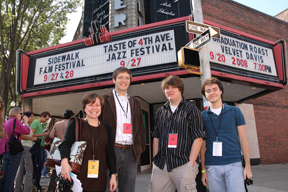UAB has been selected by the Ford Foundation as one of 15 higher education institutions to receive a $60,000 grant for the project “Building Community through Dialogue and Ethnographic Films.”
 |
| Michele Forman, program administrator in the Center for Urban Affairs, stands with student filmmakers Stephen Webb, Chris Lee and Tyler Godsey at the recent Sidewalk Film Festival. |
“The Ford Foundation grants confirm UAB’s leadership in developing innovative curricula and collaborative co-curricular programs to help prepare our students to be engaged, knowledgeable and responsible citizens at both the local and global community levels,” says Marilyn Kurata, Ph.D., director of core curriculum enhancement and principal investigator for both grants.
Ethnographic filmmaking has taken root at UAB in recent years and is offered to students as a service-learning course. The course encourages students to explore the meaning of community at the group/
collective level and the individual level and to create films examining issues affecting the Birmingham community, including housing, education, health care, immigration, poverty and the environment. Some of these films were shown recently at the Sidewalk Film Festival.
UAB will use the new funds to fuel student events that use ethnographic film as a springboard for meaningful and constructive dialogue on controversial topics. The first of those will be a Film for Thought event, building off of the Food for Thought series, which featured open-mic forums in which students, faculty and staff come together to discuss issues of importance in today’s society. There likely will be two other Film for Thought events next semester.
“With the variety of cultures, lifestyles and personalities at UAB, learning from one another helps us to better understand each other,” explains Christopher Reaves, Ph.D., the director of the Office for Undergraduate Research. “Many universities are trying to get students to speak about difficult issues, and it’s a challenge. It’s important to develop models like Food for Thought and now Film for Thought that communicate to students that the university campus is the place to have open exchange of different opinions. Our campus, with its rich diversity, is a great place to do that.”
Supports varied efforts
The grant also will support the Diversity Week Film Scramble in the first semester of 2009, the continuing development of an Intergroup Dialogue program and additional development workshops on facilitating difficult dialogues.
The final component will be community town hall meetings that use ethnographic films to bring town and gown together to discuss community issues.
Co-investigators for the grant include Thomas Alexander, director of Student Programs, and Michele Forman and Rosie O’Beirne, program administrators in the Center for Urban Affairs. They will oversee the ethnographic film components. Mark LaGory, Ph.D., professor of sociology, will oversee the Intergroup Dialogue. Reaves will oversee assessment.
Reaves hopes to incorporate the use of an audience-response system into some of the discussions that will take place on campus. Audience-response systems feature a hand-held remote control, or clicker, that students use to convey their responses to questions in a way that is anonymous.
“This is a good way to get instant feedback and see if students understand a concept or are divided on an issue,” Reaves says. “The clicker system helps keep anonymity, but you can use the responses to assess purposes and drive conversations, which is the ultimate goal.”
Enriching learning
The Ford Foundation funded the Difficult Dialogue grant in response to growing intolerance and efforts to curb academic freedom at colleges and universities.
The goal is to help institutions enrich learning, encourage new scholarship and engage students and faculty in constructive dialogue about contentious political, religious, racial and cultural issues.
Reaves and O’Beirne were the instructors for one of the Exploring Birmingham freshman seminars created as part of the first Difficult Dialogues grant.
The students in the class got an intimate look at Birmingham through the course. They engaged in activities such as riding the DART, eating at local restaurants, touring local neighborhoods and visiting places such as Park Place, SoHo Square, the Southern History Archives and the Civil Rights Institute, among others. They analyzed these components and their relationship to community culture and lifestyle.
They looked at community planning and the environment’s impact on quality of life, and were introduced to service learning. The class also volunteered at Glen Iris Elementary School.
“We really saw the students engage in the community and learn about Birmingham,” Reaves says. “They had to get out of their comfort zone and learn about parts of the city that they weren’t aware existed or had never engaged.
“They took a critical look at the history and design of Birmingham and how that affects our quality of life and the living conditions we experience today,” he says.
“Knowing the multiple communities that make up Birmingham is the first step toward exercising civic responsibility thoughtfully.”